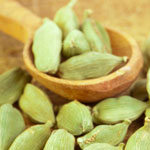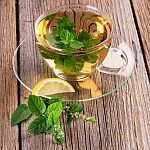How much should I drink?
14.06.2010 | People in Germany very early learn to drink daily a lot. Dr Mhalank about the drinking habits in Europe and the view of ayurveda on it.
It was winter time in India. The air was rather cool but the sun was pleasantly warm. For the first time in life I was confronting with so many foreigner patients. The whole day I was busy giving therapies and consultations and had to answer innumerable questions regarding Indian culture, Ayurveda, Ayurvedic principles and treatments. Though strenuous, it was making me great fun.
Many of the patients were Europeans. Every day I was watching them. What was new to me and had struck me that time was their drinking habit. No matter whether they were resting or reading, watching TV or hearing a lecture or were just having chitchat, they always had a glass of some tea, water or other drink in their hands. And always in between, they were sipping their drink. So everyday many such glasses were consumed by them. “How come they have so much thirst?”, I started thinking. It was winter time, the period when we have minimum thirst in India. As compared to them I was not drinking even 50% of what they were drinking, though I was talking and working the whole day. But here I was watching people who were just resting the whole day and yet were drinking double than me. Were their bodies really demanding so much liquid that every half an hour they had to empty a glass of tea, water or some other drink? Many of them were having such diseases wherein excessive drinking was contraindicated according to Ayurveda. Of course I had not told them during the consultation that they should not drink unnecessarily. I had assumed that they would listen to the calls of their own bodies and would drink only when they would be really thirsty. However now I was seeing them gulping glasses after glasses though the whole day they were not doing anything but sitting. This was really shocking!
Why these people were not listening to their bodies? After all they were not small children. In fact this was the minimum and simplest thing they could have done for their own health and well-being. But still they were not doing it. Their upbringing and society were responsible for it. ‘One must drink a lot’, this is what they had always heard, believed and followed. This was how they were always guided and brought up right from their childhood.
Now suddenly they were at a place where they had to follow totally different discipline & principles, understand completely different approach towards health and had to live and eat as per the constitution. The fact that over the years they had drunk excessively and that’s why had acquired their health problems was fully unknown to them. In the subsequent days I had to spend lot of time explaining them this fact. It was not easy to convince them with the principles of Ayurveda. A young man from India was suddenly contradicting what they had heard, accepted and followed for years. Many of them were Allopaths, dentists, nurses or physiotherapists by profession. Ayurvedic philosophy was totally new, unknown and unfamiliar to all of them.
Ayurveda never prescribes the same set of rules, quantities or regimens for all as the modern medicine many times does. In Ayurveda many things change as per constitution, age, season, occupation and so on.
As far as drinking habits are concerned, following points seem to be very important :
Normally Pitta-constitution persons demand more liquids than others. Since they have more fire element in their constitution, they lose lot of fluids through sweat, urine and stools. Naturally they frequently feel thirsty and need to drink more often. According to Ayurveda, normal water is cold in potency, reduces heat and increases Kapha in body. Vata and Kapha constitutions do not have so much fire element in them as Pitta-constitution has and therefore do not require as much liquid as the Pitta-constitution does. That’s why Vata and Kapha constitution persons have relatively less thirst. The fear that kidney function would get affected if one doesn’t drink at least 2 liters a day is completely meaningless and exaggerated. It’s only the Pitta-constitution people who suffer from water deficiency (dehydration) much sooner and earlier than Vata or Kapha constitution people.
Ayurveda gives lot of importance to natural urges of hunger, thirst and so on. Through such urges body sends us messages about what it needs and what it requires. So these urges should never be ignored or suppressed but should be attended immediately. According to Ayurveda, one should eat when one has hunger and one should drink when one has thirst. Eating in absence of hunger and drinking in absence of thirst affects the process of digestion and has negative influence over metabolism. Drinking cold drinks without really having a good thirst weakens the digestive fire. The one doesn’t get proper hunger and food doesn’t get digested and absorbed properly. Impure Kapha is produced in the intestine and causes diseases like cold, cough, asthma, respiratory infections, liver problems, swellings, overweight and so on.
Thirst also doesn’t remain same through out the year but in fact varies as per the seasons. In cold days it is relatively less while during hot season it is more intense. It makes therefore no sense to take the same quantity of liquid all through the year. When a person speaks, shouts or sings more, performs hectic physical activities or has fear, he certainly feels more thirsty and therefore must drink more.
Sitting in air-conditioned rooms increases dryness in body. So many people drink lot of water to combat this dryness. However it is completely wrong as it actually creates conducive environment for respiratory infections. In such situations warm liquids such as herbal tea, coffee and soups are more suitable.
With breakfast and meals people drink water in India. In Europe wider choice of juices, teas and liquors are available for the same. Warm soup at the beginning of meal can stimulate the gastric fire and act as an appetizer. But cold drinks cannot do this. So no cold drink before meals. Cheers!
From,
Dr. Abhijit Mhalank, MD (Ayu), DYA
42/677 Lokmanya Nagar, Pune 411030
Email – ammhalank@yahoo.com

About the Author:
Dr. Abhijit Mhalank is an experienced Ayurvedic physician and has specialized in Ayurvedic pathology. His several articles and books have already got published in various languages. He has also developed a CD ‘Encyclopaedia Ayurcedica’ which is a pharmacopoeia of Ayurvedic medicines in software form and contains data of thousands of Ayurvedic preparations. Apart from English, Dr Mhalank also knows German, Sanskrit and two other Indian languages and has given numerous lectures and consultations in Germany, France, Austria, Switzerland, Italy and Spain. He is regular participant in radio and television programmes.

.jpg)


.png)

.jpg)


